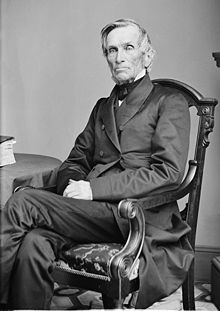Theodore Frelinghuysen
Theodore Frelinghuysen (born March 20, 1787 in Franklin Township , New Jersey , † April 12, 1862 in New Brunswick , New Jersey) was an American politician who held the offices of Attorney General of New Jersey, US Senator and Mayor of Newark , before running as Whig for Vice President in 1844 . The municipality Frelinghuysen Township was named in 1848 after him.
biography
Frelinghuysen was on March 20, 1787 Somerset County , the son of Frederick Frelinghuysen born and Catharine Frelinghuysen. He graduated from the College of New Jersey , now Princeton University , in 1804 , and then studied law with his brother John and later with Richard Stockton . In 1808 he was admitted to the bar and opened a law firm.
In 1809 he married Charlotte Mercer (1790-1854). The marriage remained childless, but after the death of his brother Frederick (1788–1820) the couple adopted his son Frederick Theodore (1817–1885), who later became Secretary of State of the United States . Theodore Frelinghuysen married his second wife Harriet Pumpelly in 1857.
He was appointed Attorney General of the State of New Jersey in 1817 , turned down an appeal to the State Supreme Court, and became a Senator for the National Republican Party in 1829 . In this role, he held a six-hour long speech against the Indian Removal Act (Engl. For Indians Resettlement Act ), which he refused deeply. He held this office until 1835.
From 1839 to 1844 he was Mayor of Newark and ran unsuccessfully as Vice President in 1844 at the side of Henry Clay . From 1839 to 1850 he was President of New York University ; then he moved to the office of President of Rutgers College , where he remained until 1862. He was Vice President of the American Sunday School Union and the American Colonization Society from 1826 to 1861 , President of the American Board of Commissioners for Foreign Missions from about 1841 to 1857, and from 1846 to 1862 he headed the American Bible Society. He was a staunch opponent of slavery and was also referred to as the Christian statesman .
Frelinghuysen died on April 12, 1862 in New Brunswick and was buried there in the cemetery of the "First Reformed Church".
literature
- Francis Paul Prucha: The Great Father: The United States Government and the American Indians . University of Nebraska Press, 1986, ISBN 0-8032-8712-7 (English).
Web links
- Theodore Frelinghuysen in the Biographical Directory of the United States Congress (English)
- Theodore Frelinghuysen in the database of Find a Grave (English)
- Leadership on the Banks: Rutgers' Presidents, 1766-2004 (Engl.)
Individual evidence
- ↑ Living Places: Frelinghuysen Township
- ^ Death of Hon. Theodore Frelinghuysen , New York Times . April 13, 1862. Retrieved July 21, 2007.
| personal data | |
|---|---|
| SURNAME | Frelinghuysen, Theodore |
| BRIEF DESCRIPTION | American politician and lawyer |
| DATE OF BIRTH | March 20, 1787 |
| PLACE OF BIRTH | Franklin Township , New Jersey |
| DATE OF DEATH | April 12, 1862 |
| Place of death | New Brunswick , New Jersey |


